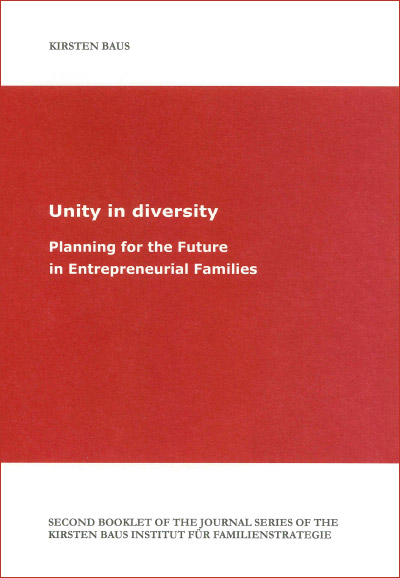Unity in diversity – Planning for the Future in Entrepreneurial Families
Second Booklet
of the Institute‘s Journal Series
A family grows from generation to generation and the family business will inevitably face the issue of maintaining the entrepreneurial family's unity. Today, where the individual naturally takes priority over the family, that can only mean that one has to cope with the difficult task of achieving unity in diversity. To organize the familial bond is to integrate diverging interest to avoid conflicts. In planning for the future, there is no way around the family. In the family business, family is in fact not everything, but without a stable and functioning family, everything is nothing.
The booklets of the journal series of the Kirsten Baus Institut für Familienstrategie are 9,90€ each, postage excluded. Please fill in the form below and we will send your order and bill to you immediately.
Extract
The family grows
Entrepreneurs typically have more rather than less children. A dynastic trait seems to be at play – perhaps unknowingly: Three children are almost the lower limit. Theo Müller, CEO of the largest seller of milk products in Germany, has nine children, the Porsche-grandson Ferdinand Piëch even has twelve. Family trees of entrepreneurial families evidently show how rapid this growth can take place, what dynamic lies in this development. Families that actually have become dynasties oftentimes have more than a hundred shareholders. Among them are Röchling, Heraeus and Henkel, at Haniel their numbers are in the four hundreds. These numbers may not be representative, but in decision making, issues already notoriously arise where two are involved. Oftentimes there is a lack of cognition of this development and even more often a lack of strategic planning.
Equal sharing of an inheritance has increasingly become the norm. Carelessly, it ends in the fragmentation of shareholdings. This leads to participation and responsibility lying on more and more shoulders. In most cases, a corrective for this development is lacking, such as the inheritance regulations for agriculture under German law and in the past the nobility`s right of primogeniture – regulations that have kept the inheritance undivided and that at the most carry an obligation to compensate and pay alimony. A business can literally be faced with quite a bit of family. It is surprising, how little the issues arising from a growing family are seen and that a family requires a regulatory framework just as the business does. The family's growth and increasing size require consequences – for the structures and rules in the family and their relation to the business. This spans from the question of who may hold shares, through to rules on dividends and retention of profits and integration and participation of children-in-law. The number of issues in need of clarification are exceptionally high, the consequences of decisions are complex, the chance of non-intended effects is high. In short: an entrepreneurial family is well advised to not let things slide, make themselves aware of them, and to not only approach them purposefully, but especially early on.
Family Strategy and planning for the future
While the process of change in a business can be managed with a myriad of instruments, the range of choices for strategic planning of the future in and for an entrepreneurial family are hardly known and not large. While having been established for some time now in the United States and being in demand and valued as an efficient advisory service, the Family Strategy is relatively unknown in German-speaking countries. It helps in organizationally gaining control of an entrepreneurial family's growth. A growing family will face significant challenges if they want to maintain the business as a family business. The law of large numbers – more people, more opinions, more interests – is as much at play here as are qualitative changes. At the latest during the inheritance will the ever increasing equal sharing among heirs lead to fragmentation. To get a grip on it, solely amending the articles of association as a reaction is barely enough. Planning for the future in a family is overly dominated by issues of law and tax alone. The advice by lawyers and tax advisors and the resulting work products – wills, articles of association, marriage contracts, testamentary contracts and pooling agreements – do not solve a critical issue. The growing distance to the business as well as to the other family members fosters alienation from each other. The dwindling of common interest and the individual interest coming to the fore can become a heavy burden for the business. The number of businesses in family hands that have stayed blind towards this development and have found their end in conflicts in the family, is vast. It does not always have to end as severe. But also those companies that throughout the years have been paralyzed by obstructions of their capacities to act, that are not capable of making decisions on key questions – such as succession – they all fall short of their capabilities and thereby weaken their market position. The Family Strategy avoids such developments by informing the family – the sooner the better – about the consequences of turning a blind eye to this development and not taking action. It defines, together with the family, strategic goals for the family and the business and develops ways for their implementation. It organizes the family and binds it to rules that counteract alienation and make constructive cooperation easier.
To comprehend how the Family Strategy proceeds, what its analytical potential consists of, what its goal is, what its results are, a fictitious case study shall be used.
